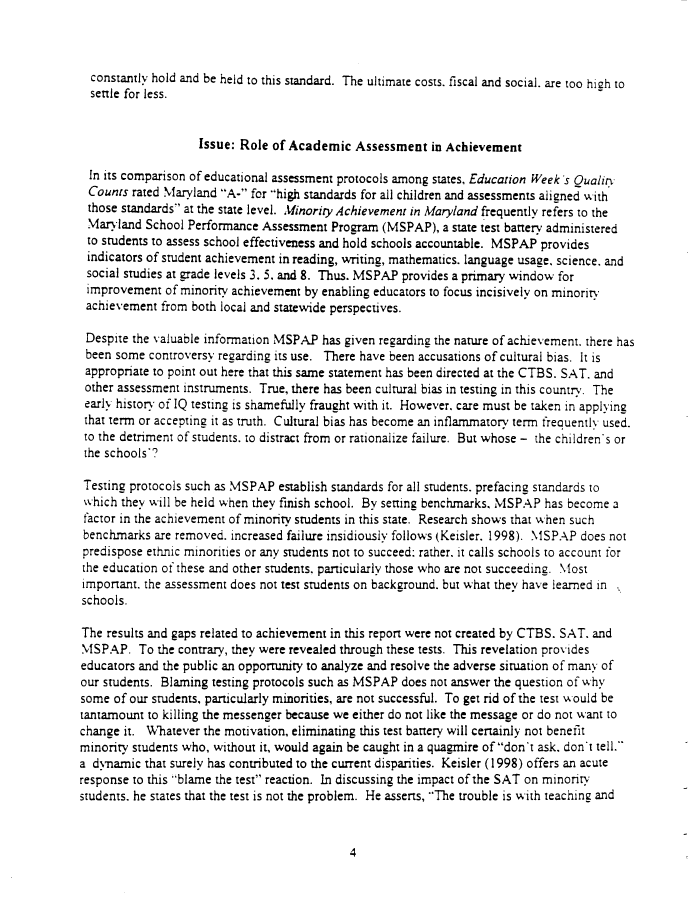 |
||||
|
TASK FORCE TO STUDY THE HISTORY AND LEGACY OF SLAVERY IN MARYLAND (Final Report) 1999/12/31 MdHR 991422 MdHR 991422, Image No: 183 Print image (86K) |
 |
||||
|
TASK FORCE TO STUDY THE HISTORY AND LEGACY OF SLAVERY IN MARYLAND (Final Report) 1999/12/31 MdHR 991422 MdHR 991422, Image No: 183 Print image (86K) |
| constantly hold and be held to this standard. The ultimate costs, fiscal and social, are too hi eh to settle for less. Issue: Role of Academic Assessment in Achievement In its comparison of educational assessment protocols among states, Education Week's Quality Counts rated Maryland "A-" for ''high standards for all children and assessments aligned with those standards" at the state level. Minority Achievement in Maryland frequently refers to the Man-land School Performance Assessment Program (MSPAP), a state test bartery administered to students to assess school effectiveness and hold schools accountable. MSPAP provides indicators of student achievement in reading, writing, mathematics, language usage, science, and social studies at grade levels 3. 5, and 8. Thus. MSPAP provides a primary window for improvement of minority achievement by enabling educators to focus incisively on minority achievement from both locaJ and statewide perspectives. Despite the valuable information MSPAP has given regarding the nature of achievement, there has been some controversy regarding its use. There have been accusations of cultural bias. It is appropriate to point out here that this same statement has been directed at the CTBS. SAT. and other assessment instruments. True, there has been cultural bias in testing in this country. The early history of IQ testing is shamefully fraught with it. However, care must be taken in applying that term or accepting it as truth. Cultural bias has become an inflammatory term frequently used, to the detriment of students, to distract from or rationalize failure. But whose - the children's or the schools'0 Testing protocols such as MSPAP establish standards for all students, prefacing standards to which they will be held when they finish school. By setting benchmarks, MSPAP has become a factor in the achievement of minority students in this state. Research shows that when such benchmarks are removed, increased failure insidiously follows (Keisler. 1998). MSPAP does not predispose ethnic minorities or any students not to succeed: rather, it calls schools to accouni for the education of these and other students, particularly those who are not succeeding. Most important, the assessment does not test students on background, but what they have learned in , schools. The results and gaps related to achievement in this report were not created by CTBS. SAT. and MSPAP. To the contrary, they were revealed through these tests. This revelation provides educators and the public an opportunity to analyze and resolve the adverse situation of many of our students. Blaming testing protocols such as MSPAP does not answer the question of why some of our students, particularly minorities, are not successful. To get rid of the test would be tantamount to killing the messenger because we either do not like the message or do not want to change it. Whatever the motivation, eliminating this test battery will certainly not benefit minority students who, without it, would again be caught in a quagmire of "don't ask, don't tell." a dynamic that surely has contributed to the current disparities. Keisler (1998) offers an acute response to this "blame the test" reaction. In discussing the impact of the SAT on minority students, he states that the test is not the problem. He asserts, "The trouble is with teaching and |